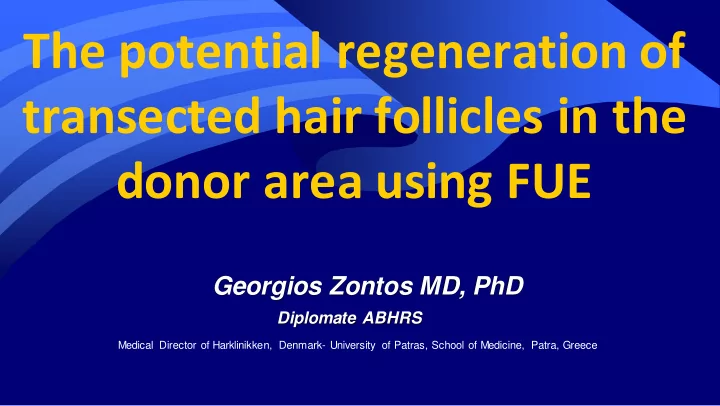

The potential regeneration of transected hair follicles in the donor area using FUE Georgios Zontos MD, PhD Diplomate ABHRS Medical Director of Harklinikken, Denmark- University of Patras, School of Medicine, Patra, Greece
DISCLOSURES: The Speaker has no relevant financial relationship or conflict of interest to declare. 2 Georgios Zontos MD, PhD, Diplomate ABHRS
Background ➢ What happens to transected hair follicles in the donor area? ➢ Devroye found that only 60% of transected hair follicles regrow ➢ regrowth is unpredictable but is more probable if transection occurs at the upper part of the follicle 3 Georgios Zontos MD, PhD, Diplomate ABHRS
Objectives The purpose of this study is -to precisely quantify the regrowth rate of transected hair follicles by using advanced image processing techniques. -to investigate under which conditions a potential regeneration of hair follicles will likely occur 4 Georgios Zontos MD, PhD, Diplomate ABHRS
Materials and Methods ▪ 3 patients ▪ 6 areas of interest in the donor region were permanently marked by a tattoo ▪ A 0.6 sharp circular punch was used to deliberately increase the transection rate while harvesting within the marked areas 5 Georgios Zontos MD, PhD, Diplomate ABHRS
Materials and Methods All the FUs were precisely mapped before and after the harvesting process while the extracted grafts were photographed and observed under a stereoscope Georgios Zontos MD, PhD, Diplomate ABHRS 6
Materials and Methods A proprietary image processing system was adapted to compare the micro-photographs taken of each study square Micro photographs were taken of each study square before and immediately after the harvesting process and 9 months later. 7 Georgios Zontos MD, PhD, Diplomate ABHRS
Comparison of micro-photographs before and immediately after the harvesting process 8 Georgios Zontos MD, PhD, Diplomate ABHRS
Comparison of micro-photographs before and 9 months after the harvesting process Georgios Zontos MD, PhD, Diplomate ABHRS 9
What was recorded ? ➢ The initial number of FUs /hairs ➢ Number of harvested grafts/hairs ➢ Number of remaining FUs /hairs ➢ Number of intact extracted hair follicles ➢ Number of transected hair follicles ➢ Number of regenerated hair follicles over the study period What was measured ? - The percentage of regeneration of transected hair follicles in each study square. - Any evidence of regeneration of hair growth associated with intact extracted hair follicles . 10 Georgios Zontos MD, PhD, Diplomate ABHRS
Protocol A -Statistical analysis of the results 11 Georgios Zontos MD, PhD, Diplomate ABHRS
Protocol B:The correlation between the location of transection and regeneration of the remaining part of the follicles From 3 new patients, 60 FUs were transected transversally, leaving less than 50% of the FU length. 12 Georgios Zontos MD, PhD, Diplomate ABHRS
Protocol B -Statistical Analysis of the results 13 Georgios Zontos MD, PhD, Diplomate ABHRS
Comparison of Regeneration Percentage in both Protocols 84.91% 90.00% 66.67% 80.00% 70.00% 60.00% 50.00% A B 40.00% 30.00% 20.00% 10.00% 0.00% Regeneration Percentage A Regeneration Percentage B The Regeneration Percentage in Protocol B decreased by 21.5% The lower the transection level occurs, the lower the regrowth rate is 14 Georgios Zontos MD, PhD, Diplomate ABHRS
Conclusions - There is a high degree of accordance with Devroye in Protocol B. - Transecting FUs ,is likely to influence their vitality. - if transection occurs at the upper third part of the hair follicle the regeneration rate is 100% - Any damage at the level of the hair bulge ,or absence of it, may diminish the regeneration capability of the remaining transected hair follicle - A high transection rate potentially affects the harvesting capacity of the donor area especially for a novice surgeon - There is no evidence of regrowth of intact extracted hair follicles. Photo Courtesy: 15 Georgios Zontos MD, PhD, Diplomate ABHRS Hair Transplantation, Walter P. Unger, Ronald Shapiro
The take - home message - The potential regeneration of transected hair follicles varies depending on where the location of transection has occurred during the FUE process. 16 Georgios Zontos MD, PhD, Diplomate ABHRS
Recommend
More recommend